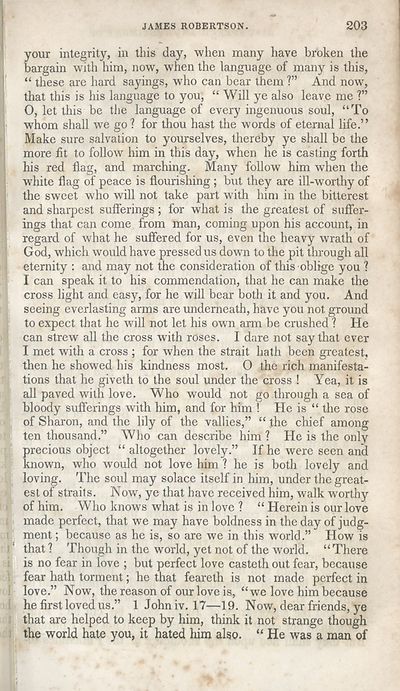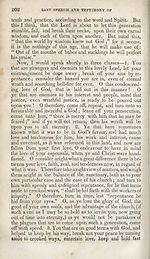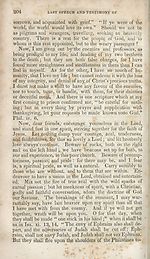Religion & morality > Cloud of witnesses, for the royal prerogatives of Jesus Christ, or, The last speeches and testimonies of those who suffered for the truth in Scotland, in the years 1681-1688, with an appendix, containing the Queensferry paper, Torwood excommunications, &c
(259)
Download files
Complete book:
Individual page:
Thumbnail gallery: Grid view | List view

JAMES ROBERTSON.
203
your integrity, in this day, when many have broken the
bargain with him, now, when the language of many is this,
“ these are hard sayings, who can bear them ?” And now,
that this is his language to you, “ Will ye also leave me ?”
O, let this be the language of every ingenuous soul, “To
whom shall we go? for thou hast the words of eternal life.”
Make sure salvation to yourselves, thereby ye shall be the
more lit to follow him in this day, when he is casting forth
his red flag, and marching. Many follow him when the
white flag of peace is flourishing; but they are ill-worthy of
the sweet who will not take part with him in the bitterest
and sharpest sufferings ; for what is the greatest of suffer¬
ings that can come from man, coming upon his account, in
regard of what he suffered for us, even the heavy wrath of
God, which would have pressed us down to the pit through all
eternity : and may not the consideration of this oblige you ?
I can speak it to his commendation, that he can make the
cross light and easy, for he will bear both it and you. And
seeing everlasting arms are underneath, have you not ground
to expect that he will not let his own arm be crushed ? He
can strew all the cross with roses. I dare not say that ever
I met with a cross ; for when the strait hath been greatest,
then he showed his kindness most. O the rich manifesta¬
tions that he giveth to the soul under the cross ! Yea, it is
all paved with love. Who would not go through a sea of
bloody sufferings with him, and for him ! He is “ the rose
of Sharon, and the lily of the vallies,” “ the chief among
ten thousand.” Who can describe him ? He is the only
precious object “ altogether lovely.” If he were seen and
known, who would not love him ? he is both lovely and
loving. The soul may solace itself in him, under the great¬
est of straits. Now, ye that have received him, walk worthy
of him. Who knows what is in love ? “ Herein is our love
made perfect, that we may have boldness in the day of judg¬
ment ; because as he is, so are we in this world.” How is
t' that? Though in the world, yet not of the world. “There
i is no fear in love ; but perfect love casteth out fear, because
1 fear hath torment; he that feareth is not made perfect in
oj love.” Now, the reason of our love is, “we love him because
T he first loved us.” 1 John iv. 17—19. Now, dear friends, ye
1 that are helped to keep by him, think it not strange though
the world hate you, it hated him also. “ He was a man of
203
your integrity, in this day, when many have broken the
bargain with him, now, when the language of many is this,
“ these are hard sayings, who can bear them ?” And now,
that this is his language to you, “ Will ye also leave me ?”
O, let this be the language of every ingenuous soul, “To
whom shall we go? for thou hast the words of eternal life.”
Make sure salvation to yourselves, thereby ye shall be the
more lit to follow him in this day, when he is casting forth
his red flag, and marching. Many follow him when the
white flag of peace is flourishing; but they are ill-worthy of
the sweet who will not take part with him in the bitterest
and sharpest sufferings ; for what is the greatest of suffer¬
ings that can come from man, coming upon his account, in
regard of what he suffered for us, even the heavy wrath of
God, which would have pressed us down to the pit through all
eternity : and may not the consideration of this oblige you ?
I can speak it to his commendation, that he can make the
cross light and easy, for he will bear both it and you. And
seeing everlasting arms are underneath, have you not ground
to expect that he will not let his own arm be crushed ? He
can strew all the cross with roses. I dare not say that ever
I met with a cross ; for when the strait hath been greatest,
then he showed his kindness most. O the rich manifesta¬
tions that he giveth to the soul under the cross ! Yea, it is
all paved with love. Who would not go through a sea of
bloody sufferings with him, and for him ! He is “ the rose
of Sharon, and the lily of the vallies,” “ the chief among
ten thousand.” Who can describe him ? He is the only
precious object “ altogether lovely.” If he were seen and
known, who would not love him ? he is both lovely and
loving. The soul may solace itself in him, under the great¬
est of straits. Now, ye that have received him, walk worthy
of him. Who knows what is in love ? “ Herein is our love
made perfect, that we may have boldness in the day of judg¬
ment ; because as he is, so are we in this world.” How is
t' that? Though in the world, yet not of the world. “There
i is no fear in love ; but perfect love casteth out fear, because
1 fear hath torment; he that feareth is not made perfect in
oj love.” Now, the reason of our love is, “we love him because
T he first loved us.” 1 John iv. 17—19. Now, dear friends, ye
1 that are helped to keep by him, think it not strange though
the world hate you, it hated him also. “ He was a man of
Set display mode to:
![]() Universal Viewer |
Universal Viewer | ![]() Mirador |
Large image | Transcription
Mirador |
Large image | Transcription
| Permanent URL | https://digital.nls.uk/132218747 |
|---|
| Description | Thousands of printed books from the Antiquarian Books of Scotland collection which dates from 1641 to the 1980s. The collection consists of 14,800 books which were published in Scotland or have a Scottish connection, e.g. through the author, printer or owner. Subjects covered include sport, education, diseases, adventure, occupations, Jacobites, politics and religion. Among the 29 languages represented are English, Gaelic, Italian, French, Russian and Swedish. |
|---|

